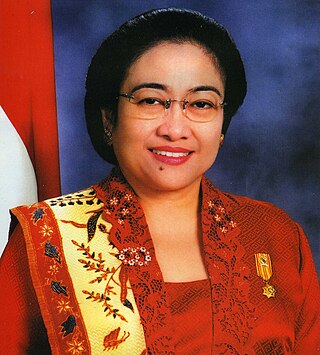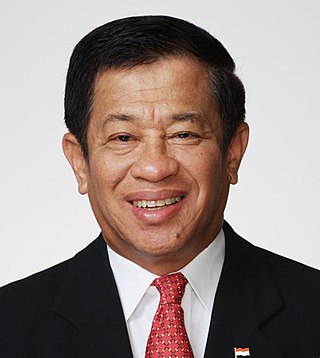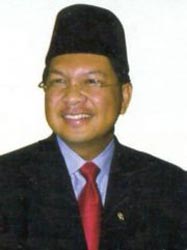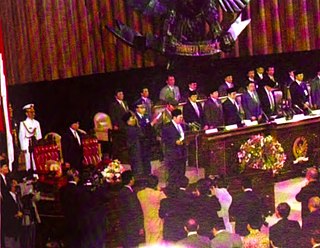
Diah Permata Megawati Setiawati Sukarnoputri is an Indonesian politician who served as the fifth president of Indonesia from 2001 to 2004. She previously served as the eighth vice president from 1999 to 2001.

Abdurrahman Wahid, though more colloquially known as Gus Dur, was an Indonesian politician and Islamic religious leader who served as the fourth president of Indonesia, from his election in 1999 until he was removed from office in 2001. A long time leader within the Nahdlatul Ulama organization, he was the founder of the National Awakening Party (PKB). He was the son of Minister of Religious Affairs Wahid Hasyim, and the grandson of Nahdatul Ulama founder Hasyim Asy'ari. Due to a visual impairment caused by glaucoma, he was blind in the left eye and partially blind in his right eye. He was the first president of Indonesia to have had physical disabilities.

The Indonesian Democratic Party of Struggle is a centre to centre-left secular-nationalist political party in Indonesia. Since 2014, it has been the ruling and largest party in the House of Representatives (DPR), having secured 128 seats in the last election. The party is led by Megawati Sukarnoputri, who served as the President of Indonesia from 2001 to 2004. It is also the former party of the current president, Joko Widodo (Jokowi).

The United Development Party is an Islam-based political party in Indonesia. Due to its distinctive logo, the party is known as the "Kaaba Party".

Presidential elections were held in Indonesia on 5 July and 20 September 2004. As no candidate won a majority in the first round, a runoff was held, in which Susilo Bambang Yudhoyono defeated Megawati Sukarnoputri and was elected president. They were the first direct presidential elections in the history of Indonesia; prior to a 2002 amendment to the Constitution of Indonesia, both the president and vice president had been elected by the People's Consultative Assembly (MPR).

Hamzah Haz is an Indonesian politician who served as the ninth vice president of Indonesia from 2001 to 2004 under President Megawati Sukarnoputri. Prior to serving as vice president, Hamzah served as a cabinet minister and a member of the People's Representative Council (DPR). He also chaired the United Development Party (PPP) from 1998 to 2007, and was the party's presidential candidate in the 2004 Indonesian presidential election.

Yusril Ihza Mahendra is an Indonesian lawyer, politician and academic, who is currently serving as the leader of the Crescent Star Party (PBB) since 2015. Previously, he served as the leader of the PBB from 1998 until 2005, Minister of Justice and Human Rights from 2004 until 2007, and member of the People's Representative Council from 1999 until 2009.

The People's Consultative Assembly of the Republic of Indonesia is the legislative branch in Indonesia's political system. It is composed of the members of the House of Representatives (DPR) and the Regional Representative Council (DPD). Before 2004, and the amendments to the 1945 Constitution, the MPR was the highest governing body in Indonesia.

Agum Gumelar is a politician and former general of the Indonesian National Armed Forces. He is a former minister having held several positions, a former chairman of Indonesian Football Association and National Sports Committee of Indonesia. He is an alumnus of the National Military Academy in Magelang, Central Java and Medical Faculty of Padjadjaran University in Bandung, West Java. In 1998, he received a master's degree from Indonesian Global Management Institute, a diploma mill that was banned in 2005.

The president of the Republic of Indonesia is the head of state and head of government of the Republic of Indonesia. The president leads the executive branch of the Indonesian government and is the commander-in-chief of Indonesian National Armed Forces and Indonesian National Police. Since 2004, the president and vice president are directly elected to a five-year term, once renewable, allowing for a maximum of 10 years in office. The current President of the Republic of Indonesia is Joko Widodo.

The National Unity Cabinet was the Indonesian cabinet which served under President Abdurrahman Wahid and Vice President Megawati Sukarnoputri from 29 October 1999 until 23 July 2001. The Cabinet was formed after Wahid and Megawati were elected President and Vice President by the People's Consultative Assembly (MPR). The cabinet was originally designed to look after the interests of the various political parties and the Indonesian National Armed Forces, but this notion quickly disappeared as Wahid's presidency began to break down.

The Parliamentary Complex of Indonesia, also known as the MPR/DPR/DPD Building, is the seat of government for the Indonesian legislative branch of government, which consists of the People's Consultative Assembly (MPR), the People's Representative Council (DPR) and the Regional Representative Council (DPD).

Laksamana Sukardi is an Indonesian politician, reformist and banker who served as Minister of State Owned Enterprises (BUMN) under the presidencies of Abdurrahman Wahid and Megawati Sukarnoputri.
From 20 to 21 October 1999, the People's Consultative Assembly (MPR), the legislative branch of Indonesia, met to elect both the president and vice president of the country for a five-year term. The incumbent president, B. J. Habibie, declined to stand for election. On 20 October, Abdurrahman Wahid, chairman of the Nahdlatul Ulama, was elected president and inaugurated on the same day. Wahid's opponent, Megawati Sukarnoputri was subsequently elected vice president the next day. The elections represented the first relatively democratic and peaceful transfer of power in the history of Indonesia.

President of Indonesia Decree of 23 July 2001 was issued by the fourth President of Indonesia, Abdurrahman Wahid, at the climax of his standoff with the People's Consultative Assembly (MPR) and other sections of society, including the Indonesian National Armed Forces (TNI).

The inauguration of Abdurrahman Wahid as the fourth president of Indonesia took place on Wednesday, 20 October 1999 at the Parliamentary Complex, Jakarta. The ceremony marked the commencement of Wahid's only term as president.

The inauguration of Megawati Sukarnoputri as the fifth president of Indonesia took place on Monday, 23 July 2001. The ceremony was held at the Parliamentary Complex shortly after the MPR vote her to become president, the ceremony also marked the end of Abdurrahman Wahid's term as president following his impeachment after the presidential decree on the same day.

On Wednesday, 20 October 2004, President-elect Susilo Bambang Yudhoyono was inaugurated as the 6th president of Indonesia. Yudhoyono was the first democratically direct-elected president of Indonesia, after previous presidents was elected by the People's Consultative Assembly.
The People's Consultative Assembly, the bicameral legislature of Indonesia, passed a series of resolutions of the People's Consultative Assembly or TAP MPR throughout the 1960s, to the very last issued in 2003.
















